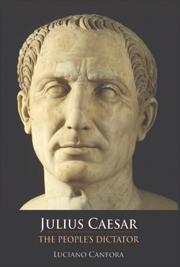Book contents
- Frontmatter
- Contents
- Translators' Note
- Acknowledgements
- Foreword
- PART I FROM SULLA TO CATILINE
- PART II FROM THE TRIUMVIRATE TO THE CONQUEST OF GAUL
- PART III THE LONG CIVIL WAR
- PART IV FROM THE CONSPIRACY TO THE TRIUMPH OF CAESARISM
- 29 Inklings of Conspiracy
- 30 ‘Iure caesus’
- 31 The Lupercalia Drama
- 32 The Dictatorship
- 33 Epicureans in Revolt?
- 34 The Hetairia of Cassius and the Recruitment of Brutus
- 35 A Conspirator's Realism: Cassius Settles for the Second Rank
- 36 Some Unexpected Refusals
- 37 Cicero – an Organiser of the Conspiracy?
- 38 The Serious Mistake of Dismissing the Escort
- 39 The Dynamics of the ‘Tyrannicide’
- 40 ‘Where's Antony?’
- 41 Caesar's Body: How to Turn Victory into Defeat
- 42 The Wind
- Chronology
- Bibliography
- Index
33 - Epicureans in Revolt?
from PART IV - FROM THE CONSPIRACY TO THE TRIUMPH OF CAESARISM
Published online by Cambridge University Press: 05 August 2013
- Frontmatter
- Contents
- Translators' Note
- Acknowledgements
- Foreword
- PART I FROM SULLA TO CATILINE
- PART II FROM THE TRIUMVIRATE TO THE CONQUEST OF GAUL
- PART III THE LONG CIVIL WAR
- PART IV FROM THE CONSPIRACY TO THE TRIUMPH OF CAESARISM
- 29 Inklings of Conspiracy
- 30 ‘Iure caesus’
- 31 The Lupercalia Drama
- 32 The Dictatorship
- 33 Epicureans in Revolt?
- 34 The Hetairia of Cassius and the Recruitment of Brutus
- 35 A Conspirator's Realism: Cassius Settles for the Second Rank
- 36 Some Unexpected Refusals
- 37 Cicero – an Organiser of the Conspiracy?
- 38 The Serious Mistake of Dismissing the Escort
- 39 The Dynamics of the ‘Tyrannicide’
- 40 ‘Where's Antony?’
- 41 Caesar's Body: How to Turn Victory into Defeat
- 42 The Wind
- Chronology
- Bibliography
- Index
Summary
The historian who claimed that persons of Epicurean belief dominated the conspiracy against Caesar, and that Epicureanism, creatively reformulated in the fifth book of Lucretius, underpinned the anti-monarchic rebellion of these ‘Epicureans in revolt’, was Arnaldo Momigliano. His belligerent essay is compelling but largely unfounded, especially in its central tenets: that the conspirators and later republican fighters were mostly ‘unconventional’ (that is, politically committed) Epicureans, and that Lucretius was their formative reading. It remains a good article on the aesthetic level, extolling the ‘heroic’ nexus between Epicureanism in philosophy and militant libertarian republicanism in politics. For Momigliano, writing that daring essay was a kind of catharsis, after years of prose calibrated according to its compatibility with the ‘controlled tolerance’ of fascism and that of the Enciclopedia Italiana. For the sake of his thesis he expands the circle of the Epicureans,3 and, if by chance any are hostile to the conspiracy or want nothing to do with it, they are enlisted all the same. This is the case with Statilius, an ‘Epicurean’ who, Plutarch clearly affirms, immediately rejected the advances of the person who wanted to bring him into the conspiracy - no less a figure than Marcus Junius Brutus in person. That man might not be the same Statilius who had been in Africa with Cato and then died at Philippi: at least, there is no reliable confirmation of it.
- Type
- Chapter
- Information
- Julius CaesarThe People's Dictator, pp. 296 - 305Publisher: Edinburgh University PressPrint publication year: 2007



